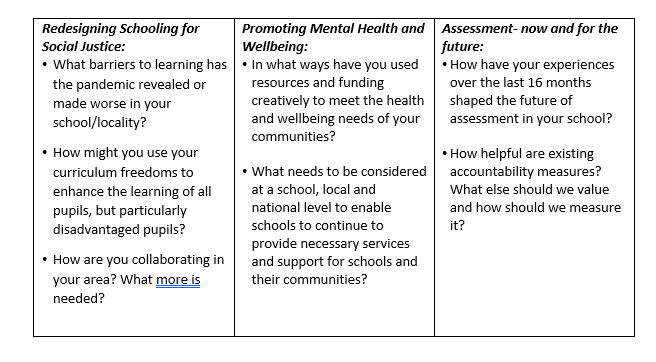
Laura Burton, Senior Education Lead and Head of Primary Network at SSAT, reflects on the annual Primary Conference highlighting key takeaways from the event.
Earlier this month, leaders from across the SSAT Primary Network came together for the annual Primary Conference. Through a combination of keynote presentations, case studies and virtual roundtable discussion, we considered on how we can embrace the current opportunity to build on our successes from the last 15 months and take action to guarantee every primary pupil their right for a strong and secure future.
Keynote and case study presentations
The event welcomed SSAT CEO Sue Williamson, who delivered a keynote presentation highlighting the power of collaboration and the importance of keeping our principles and values at our core now more than ever, as we emerge from the pandemic and plan for the future. Sue stressed the power of system leadership, in schools collectively meeting children’s needs and considering how resources can be shared for the benefit of all as an essential ingredient to achieving social justice. Acknowledging that localities will differ, and needs will be different from school to school, the important factor is opening the channels for collaborating – identifying what pockets of best practise we have within our schools and how this can best be shared. The keynote laid the foundations for the discussions across the whole morning.
Dan Edwards, Principal at Woodstock Primary Academy, shared the experiences of his team during the school closures and how lockdown meant there was a ‘communication vacuum’ across his school community. Dan believes that ‘poor communication is the catalyst for poor wellbeing’ and his approach minimised this for the Woodstock community, with impressive impact. ‘Consult, Clarity and Celebrate’ formed his ‘3 steps to community’ and, although this centered around his team’s key approaches to communication during partial school closures, he acknowledged that the developed practice would support the school as they move forward from September and beyond.
Gatley Primary School’s phase leader, Rebekah Lyall, introduced us to the school’s ‘Me Time’ curriculum, which was devised by the school after pupil wellbeing was highlighted as a priority area for children’s return to school following the second partial school closure. Over a four-week period, using the timetabled topic time, the children were able to study for ‘professorships’, which had been created in consultation with the children. The curriculum approach provided pupils with the opportunity to work collaboratively and develop key life skills, whilst exploring an area of interest to them and raise aspiration. The curriculum supported the children’s transition back into school and pupil wellbeing, with all activities able to be accessed fully remotely for those pupils who needed it. The curriculum also provided opportunities for children to revisit and develop key skills which had declined during the lockdown period.
Virtual Roundtable Discussions
Following each presentation, there were opportunities for delegates to network and discuss themes and questions that arose from the speakers. The questions below provoked reflection and identification of key priorities for schools from September, with leaders also suggesting what changes needed to be made with regards policy and external services in order for us to be able to fully meet the needs of all pupils following the pandemic. 
Sharing is caring
Please share your views on one or more of the key questions above with the primary team at SSAT to join the conversation across the primary network; and look out for more to follow in the new academic year.
